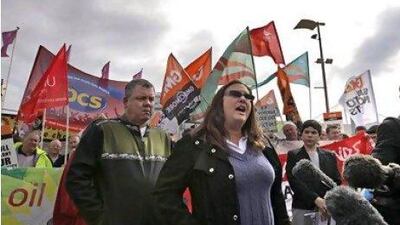BP and Rosneft, the largest Russian oil company, reached an 11th-hour agreement to extend for a month the deadline to complete a US$16 billion (Dh58.76bn) share swap yesterday.
The accord came as BP faced disgruntled shareholders at its annual meeting in London.
The share swap is considered pivotal to a landmark Arctic exploration deal between the two companies. The proposed Russian offshore oil and gas venture, announced in January, was supposed to reposition BP for growth after it was forced to sell billions of dollars of assets to pay for its oil spill in the Gulf of Mexico last year.
With Wednesday's anniversary of the fatal accident fast approaching, BP's deal with the state-owned Rosneft was hanging by a thread yesterday as a group of Russian billionaires sought to block it in court. The oligarchs, BP's partners in its existing Russian affiliate TNK-BP, had obtained an interim injunction delaying the share swap, after arguing the proposed tie-up would violate their shareholder agreement with BP.
"In Russia, TNK-BP is our primary investment vehicle in the country, and we are absolutely committed to it. It has been hugely successful," Bob Dudley, BP's chief executive, said yesterday, addressing the shareholder meeting. "However, we are also pursuing a project with Rosneft to gain access to Arctic resources … BP needs to be there."
Nevertheless, Mr Dudley later indicated there was no guarantee of the deal being consummated.
"We have to be realistic. We are in the middle of a process involving three parties, and exactly what will unfold I don't think we can speculate yet," he said, responding to a question put by Paul Arden Jones, a BP shareholder.
Carl-Henric Svanberg, the BP chairman, said the company had offered TNK rights to oil exploration in the Russian Arctic when the joint venture was formed in 2003, but the oligarchs concluded it was not in their financial interest to participate in projects with long lead-times.
"We have continued to get assurances that that was the case," Mr Svanberg said. "I actually don't think there was a possibility to bring [the TNK shareholder] on side more than we had" before announcing the Rosneft deal, he added. "This is an emerging market, it's a new nation … it is a rocky terrain. We are hopeful we will get our way there."
Mr Dudley said BP's proposed alliance with Rosneft would be good for both companies' shareholders without harming the operations of TNK-BP, which he said was "not an offshore company".
"But we will not pay large amounts" to TNK-BP to ensure the Rosneft deal, he added.
"We will continue to do business in Russia," he said, adding BP's relationship with TNK-BP was "bumpy but not dysfunctional".
"With TNK-BP, it's not personal; it's just business."
During his speech, Mr Dudley said the challenging environmental issues oil producers faced as they exploited resources in harsher and more remote locations was "a wake-up call". "We are looking at trends in the industry and looking at how we can use our skills to satisfy the world's demand for energy," he said. "The world will still need oil, and much of the new supply will have to come from new sources."
Mr Dudley said BP would double investment over the next few years, continuing to explore in established locations including the Gulf of Mexico, and also in new areas. "Much of the exploration will be in deep water," he said.
BP remained committed to paying all legitimate claims for environmental and economic damage caused by last year's oil spill. It would also seek to ensure a similar response from other firms implicated in the explosion aboard the Deepwater Horizon oil rig, which claimed 11 lives and allowed millions of barrels of oil to leak from the Macondo exploration well, the company's top two executives said.
The company's share price is still more than 25 per cent below its level before the spill.

